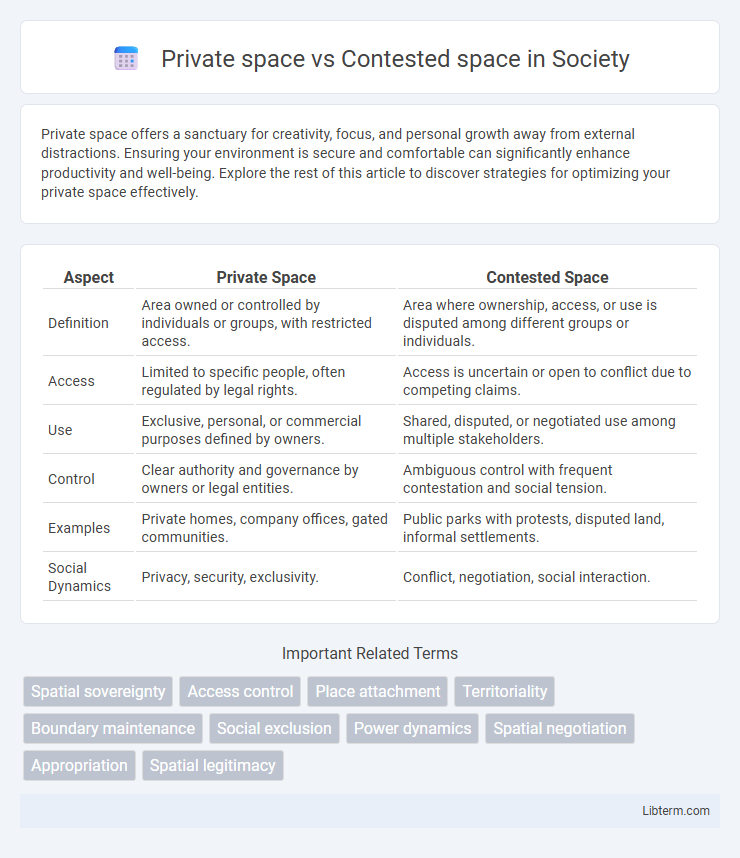Private space offers a sanctuary for creativity, focus, and personal growth away from external distractions. Ensuring your environment is secure and comfortable can significantly enhance productivity and well-being. Explore the rest of this article to discover strategies for optimizing your private space effectively.
Table of Comparison
| Aspect | Private Space | Contested Space |
|---|---|---|
| Definition | Area owned or controlled by individuals or groups, with restricted access. | Area where ownership, access, or use is disputed among different groups or individuals. |
| Access | Limited to specific people, often regulated by legal rights. | Access is uncertain or open to conflict due to competing claims. |
| Use | Exclusive, personal, or commercial purposes defined by owners. | Shared, disputed, or negotiated use among multiple stakeholders. |
| Control | Clear authority and governance by owners or legal entities. | Ambiguous control with frequent contestation and social tension. |
| Examples | Private homes, company offices, gated communities. | Public parks with protests, disputed land, informal settlements. |
| Social Dynamics | Privacy, security, exclusivity. | Conflict, negotiation, social interaction. |
Defining Private Space and Contested Space
Private space refers to areas owned or controlled by individuals or groups, where access is restricted and personal privacy is preserved, such as homes or private properties. Contested space involves locations where ownership, control, or use is disputed among multiple parties, leading to conflicts over boundaries, rights, or social behaviors, often seen in public parks or urban areas undergoing redevelopment. Understanding the distinctions between these spatial categories aids in urban planning, conflict resolution, and legal frameworks governing land use.
Historical Evolution of Spatial Boundaries
Private space historically evolved from exclusive territorial claims tied to land ownership and property rights, reflecting societal hierarchies and legal frameworks. Contested space often emerged from conflicting cultural, political, or economic interests challenging established boundaries, leading to disputes and negotiations over control and access. The dynamic interplay between private and contested spaces reveals shifting power structures and evolving definitions of spatial legitimacy through time.
Psychological Importance of Private Space
Private space plays a crucial role in psychological well-being by offering individuals a sense of control, safety, and personal identity, which is essential for emotional regulation and stress reduction. In contrast, contested space--where territorial boundaries and privacy are ambiguous or frequently challenged--can lead to heightened anxiety, conflicts, and diminished mental health. Understanding the psychological importance of private space helps in designing environments that promote dignity, autonomy, and restorative experiences.
Social Dynamics in Contested Spaces
Contested spaces often feature complex social dynamics characterized by competing claims, power struggles, and diverse stakeholder interactions, contrasting with the controlled access and clear boundaries of private spaces. In contested spaces, public usage merges with political, economic, and cultural tensions, influencing patterns of behavior, social inclusion, and conflict resolution. Understanding these dynamics is essential for urban planners and sociologists to navigate issues of territoriality, identity, and governance in shared or disputed environments.
Legal Frameworks Governing Space Ownership
Legal frameworks governing space ownership distinguish between private and contested space through national sovereignty and international treaties. Private space typically falls under property laws and zoning regulations within a country's jurisdiction, providing owners with exclusive rights and responsibilities. Contested space involves overlapping claims often regulated by international agreements, like the Outer Space Treaty, which prohibits national appropriation and emphasizes peaceful use for all humanity.
Urbanization and the Erosion of Private Space
Urbanization accelerates the erosion of private space by increasing population density and public interactions, blurring boundaries between personal and communal areas. Contested spaces emerge as urban residents negotiate access to shared resources, parks, and streets, challenging traditional notions of privacy and ownership. This shift drives new urban design strategies prioritizing adaptable, multi-use environments that balance privacy with community engagement.
Technology’s Impact on Spatial Privacy
Technology's impact on spatial privacy intensifies the tension between private space and contested space, where digital surveillance tools like drones, CCTV, and location tracking blur traditional boundaries. Advanced technologies enable unprecedented data collection in public and semi-private areas, challenging individuals' control over their personal spatial information. Innovations in encryption and privacy-enhancing tools attempt to safeguard private spaces but often struggle against pervasive monitoring embedded in contested spaces.
Cultural Perspectives on Spatial Boundaries
Cultural perspectives on spatial boundaries profoundly influence the distinction between private space and contested space, shaping social interactions and territorial claims. In many indigenous cultures, communal land is viewed as shared and contested, contrasting with Western notions that emphasize private ownership and fixed boundaries. These differing spatial concepts affect governance, conflict resolution, and the symbolic meaning attached to spaces in multicultural societies.
Conflict Resolution in Contested Spaces
Conflict resolution in contested spaces involves negotiating overlapping claims to territory, resources, or social practices where multiple groups assert rights, unlike private spaces controlled exclusively by individuals or entities. Effective strategies include mediation, inclusive dialogue, and establishing shared governance mechanisms that respect diverse interests and promote coexistence. Empirical studies highlight the importance of local stakeholder engagement and context-specific approaches to mitigating tensions and fostering sustainable peace in urban or communal contested environments.
Future Trends: Balancing Private and Contested Spaces
Future trends in urban development emphasize smart integration of private and contested spaces to enhance community interaction while preserving individual privacy. Advanced technologies such as IoT and AI enable dynamic management of these areas, optimizing security and accessibility in real-time. Urban planners increasingly employ data-driven strategies to balance shared public environments with personalized private zones, fostering sustainable and inclusive cityscapes.
Private space Infographic

 libterm.com
libterm.com